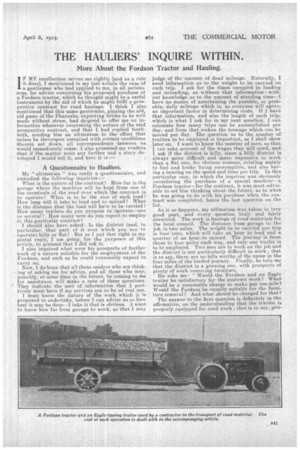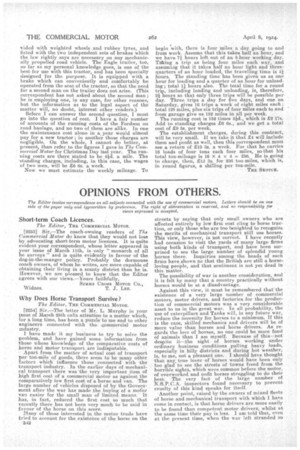THE HAULIERS' INQUIRE WITHIN.
Page 25

Page 26

If you've noticed an error in this article please click here to report it so we can fix it.
More About the Fordson Tractor and Hauling.
iF. MY recollection serves me rightly (and as a rule it does), I mentioned in my last article the ease of a gentleman who had applied to me, in all seriousness, for advice concerning his proposed purchase of a Fordson tractor, which he thought might be a useful instrument by the aid of which he might fulfil a prospective contract for road haulage. I think I also mentioned that this same gentleman, playing the old, old game of the Pharoahs, expecting bricks to be well made without straw, had deigned to offer me no information whatever coticeining the nature of the said prospective contract, and that I had replied forthwith, sending him an ultimatum to the effect that unless he thereupon complied with certain conditions therein set down, all correspondence between its would immediately cease. I also promised my readers that if the matter went any farther and a story de veloped I would tell it, and here it is :— i A Questionnaire to Hauliers.
My "ultimatum " was really a questionnaire, and embodied the following inquiries : What is the nature of the contract? How far is the garage where the machine will be kept from one of the terminals of the road over which the contract is to operate ? What is to be the size of each load? How long will it take to load and to unload? What is the distance that the load will have to be carried? How many trailers do you propose to operate—one or several? How many men do you expect to employ in. this particular contract? I should also have .asked : Is the district (and, in particular, that part of it over which you are to operate) hilly or flat? But as I put that right in my postal reply, I am going, for the purposes of this article, to pretend that I did ask it. I also inquired what were his prospects of further work of a nature suitable for the employment of the Fordson, and such as he could reasonably expect to carry on. Now, I do hope that all those readers who are thinking of asking me for advice, and all those who may, possibly, at some time in the future, be coming to me for assistance, will make a note of these questions. • They indicate the sort of information that I positively must have if my services are to be of real use. I must know the nature of the work which it is proposed to undertake, before I can advise as to how best it may be done—I take it that is obvious. I want to know how far from garage to work, so that I may
judge of the amount of dead mileage. Naturally, I need information as to the weight to be carried on each trip. I ask for the times occupied in loading and unloading, as without that information—with-out knowledge as to the amount of standing time— have no means of ascertaining the possible, or probable, daily mileage which is, as everyone will agree, an important factor in determining costs. If I have that information, and also the length of each trip, which is what I ask for in my next question, I can calculate how many trips can be accomplished per day, and from that reckon the tonnage which can be moved per day. The question as to the number of trailers to be employed is important, as I shall show later. on. I want to know the number of men, so that I can take account of the wages they will need, and I ask if the district is hilly, since a hilly district is always more difficult and more expensive to work than a flat one, foe obvious reasons, relating mainly to fuel and brake lining consumption, and also having a bearing on the speed and time per trip. In this particular case, in which the inquirer was obviously considering the purchase of a special machine--a Fordson tractor—for the contract, it was most advisable to set him thinking about the future, as to what he was going to do with his purchase when the contract was completed, hence the last question on the list.
As it so happens, my ultimatumiwas taken in very good part, and every question truly and fairly answered. The work is haulage of road materials for the local council. The distance from garage to the job is two miles. The weight to be carried per trip is four tons, which -will take an hour to load and a quarter of an hour.to unload. The journey is from three to four miles each Way, and only one trailer is to be employed. Two men are to work on the job and the district is not particularly difficult to work ; that is to say, there are DO hills worthy of the name in the -four miles of the loaded journey. Finally, he tells me that the district is a growing one, with prospects of plenty of work removing furniture.
He asks me : "Would the Fordson and an Eagle trailer be satisfactory for the contract work? What would be a reasonable charge to make per ton-mile? Would the Fordson be equally suitable for the furniture removal? And what should be charged for that ?
• The answer to the first question is definitely in the affirmative, on the understanding that the tractor is properly equipped for road work ; that is to say, pro added with weighted wheels and rubber tyres, and fitted with the two independent sets of brakes which the law rightly says are necessary on any mechanically propelled road vehicle. The Eagle trailer, too, so far as my personal knowledge goes, is one of the best for use with this tractor, and has been specially designed for the purpose. It is equipped with a brake which can conveniently and comfortably be operated from the seat af the tractor, so that the need for a second man on the trailer does not arise. (This correspondent has not asked about the second man ; he is employing one, in any case, for other reasons, but the information as to the legal aspect of the matter will, no doubt, interest other readers.)
Before I can answer the second question, I must go into the question of cost. I have a fair number of accounts of the running costs of the Ford son on road haulage, and no two of them are alike. In one the maintenance cost alone in a.. year would almost pay for a new tractor ; in another those charges are negligible. On the whole, I cannot do better, at present, than refer to the figures I gave in The COMmercial Motor for Christmas Day last year. The running costs are there stated to be 4id. a mile. The standing charges, including, irt this ease, the wages of two men, will be 26 6s, a week.
Now we must estimate the weekly mileage. To
begin with, there is four miles a day going to and from work. AS8111/1C that this takes half an hour, and we have 71 hours left out of an 8-hour working day. Taking a trip as being four miles each way, and assuming that it takes half an hour light and threequarters of an hour loaded, the travelling time is lf hours. The standing time has been given us as one hour for loading and a quarter of an hour for unloading; total 14 hours also. The total time for a round trip, including loading and unloading, is, therefore, 2-i-hours so that only three trips will be possible per day. Three trips a day for five days, and one on Saturday, gives 16 trips a week of eight miles each: total 128 miles, plus six trips of four miles each to and from garage give us 152 miles in all per week.
The running cost is 152 times 41-d., which is 22 17s. Add to standing charges 26 6n, and we get a total cost of 29 35. per week.
The establishment charges, during this contract, will be very small. If we take it that 24 will include them and profit as well, then this correspondent must see a return of 213 3s. a week. For that he carries 16 loads of four tons each four miles, so that his total ton-mileage is 16 x 4 x 4 = 256. He is going to charge, then, 213 3s. for 236 ton-miles, which is, in round figures, a shilling per ton-mile.
THE SKOTCH.






























